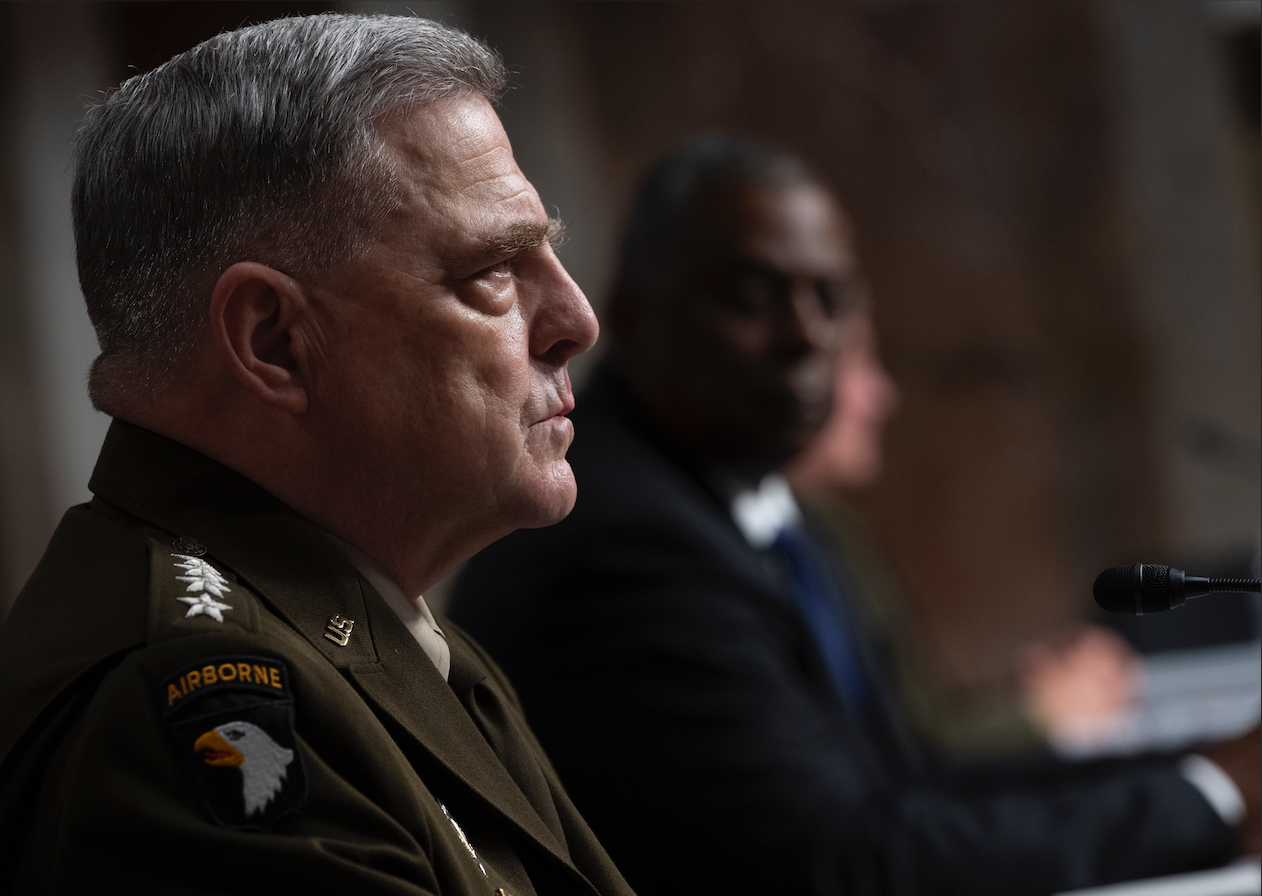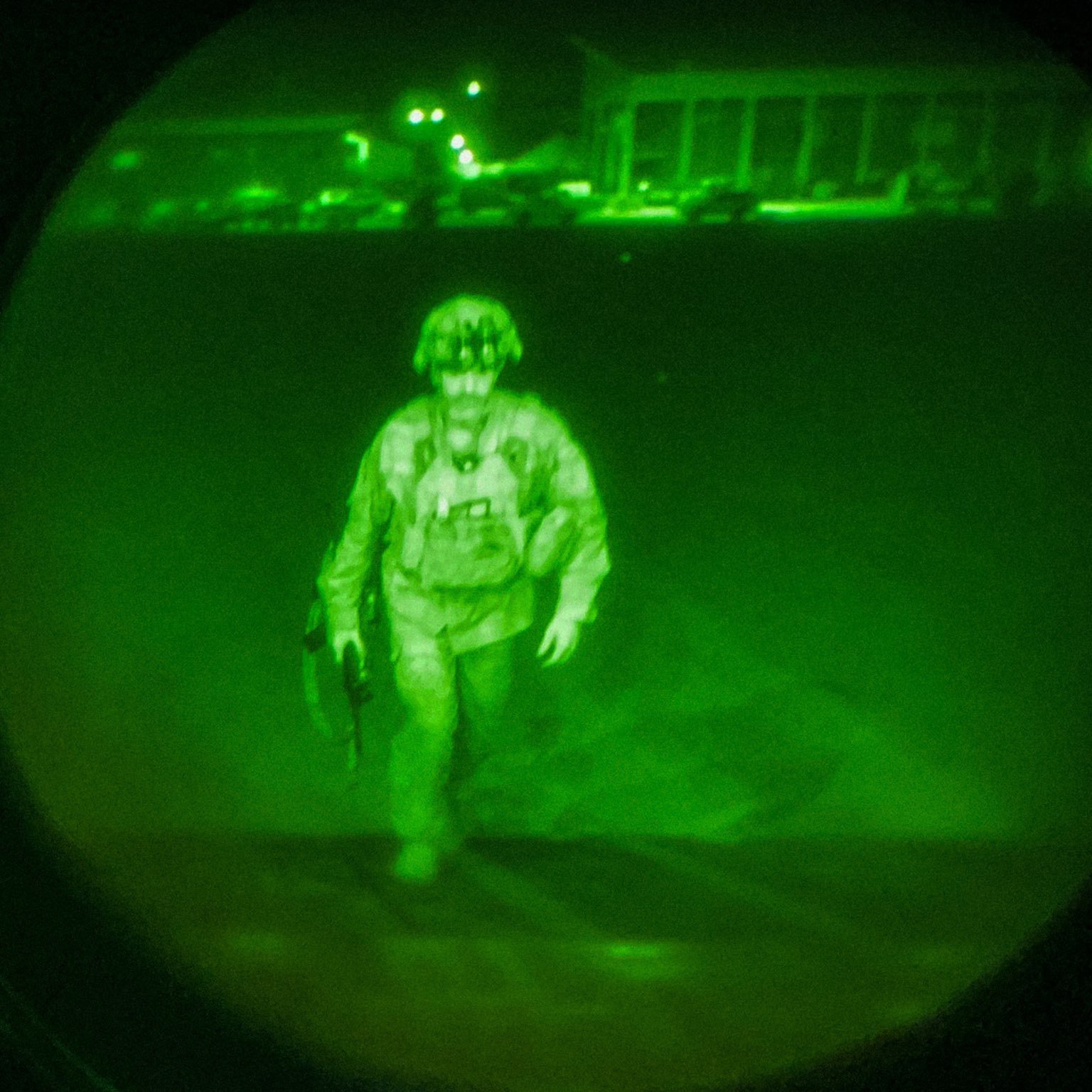
If Presidents Donald Trump and Joe Biden had chosen to ignore the dates set for the U.S. withdrawal from Afghanistan, it would have meant moving elements of the XVIII Airborne Corps into the land-locked country to hold Bagram Air Base and Kabul, and renewed fighting that would have endangered American forces, citizens and Afghans, the chairman of the Joint Chiefs of Staff told Congress today.
Testifying Tuesday before the Senate Armed Services Committee, Army Gen. Mark Milley said “the risks to American citizens were going to go up if we stayed past Sept. 1.” He said the joint chiefs and officers in the chain of command agreed with the decision not to stay past the deadline.
“On Sept. 1st, we were going to war again with the Taliban; we were already at war with ISIS” in Afghanistan, as the Aug. 26 suicide bombing at the Hamid Karzai International Airport showed, Milley said.
Eleven Marines, one Navy sailor, an American soldier and an estimated 170 Afghan civilians were killed in the airport attack.
Defense Secretary Lloyd Austin estimated that the U.S. would immediately need 5,000 troops to hold Bagram and the area surrounding the American embassy if the U.S. ignored the deadline. The expectation was that if fighting broke out, more American forces would have to be sent to Afghanistan.
Looking back at the collapse and the need to rush the evacuation of more than 124,000 service members, U.S. citizens and others, he said, “we helped build a state, but could not build a nation.”
Several times during the hearing Austin said that despite planning for withdrawal contingencies that started in April, “we certainly did not plan against a collapse of the government in 11 days.”
Although the U.S. ramped up air support to stiffen Afghan security forces’ resistance to the Taliban advance in July, U.S. Central Command chief Gen. Kenneth McKenzie said Afghan President Ashraf Ghani’s fleeing Kabul without notice in mid-August as the Taliban advanced on the capital demoralized the nation’s security forces that were still fighting.
“You have to see [Ghani’s leaving the country and the security forces deserting] as completely linked,” he said. If Ghani had stayed the security forces likely would have continued to hold the roads leading into Kabul and the capital itself, but the outlying provinces would have remained under Taliban control, McKenzie said.
“We absolutely missed the collapse,” Milley said, citing intelligence reports from Aug. 3 and Aug. 8. “The vast majority [of Afghan security forces – army and police] put down their weapons and melted away.”

Austin, Milley and McKenzie said their recommendations to keep residual American forces – between 2,500 and 4,000 troops – were presented and understood by both administrations. Austin said once Biden decided that no progress was being made on the diplomatic front in negotiations in Doha, Qatar between the Taliban and Afghan government, the president ordered a complete withdrawal.
“We had a thorough policy review,” Austin said. Milley added, “the strategic situation at the inauguration [of Biden in January 2021] was a stalemate.”
“This has been a 10-year drawdown” that began in 2011 as the American presence dropped following a surge to blunt earlier Taliban advances, Milley said of the withdrawal of U.S. forces in the 20-year war.
Austin and Milley said the only condition the Taliban met in its negotiations with the U.S., which concluded in February 2020, as not to attack American forces as they left. But that did not alter Trump’s or Biden’s decisions to leave. The Ghani government was not involved in those negotiations.
“Presidents are elected for reasons; they make decisions,” Milley said.
In his opening statement, Milley said there was an increased risk of a terrorist attack on the U.S. in the next 12 to 36 months after the withdrawal. “The Taliban still has ties to al Qaeda” and the Islamic State affiliate in the country remains engaged in violence that led to numerous attacks in recent months in Kabul. The counterterrorism mission “will be much harder now,” Milley said in his prepared testimony.
As for military lessons learned, Milley said removing American advisers from accompanying Afghan army units three years ago played a role in the demoralization of that force. “You can’t measure the human heart by a machine,” he said.
McKenzie said the withdrawal of American contractors who were critical to the maintenance and operations of Afghan aircraft had an effect on the ground forces. Milley also noted the limits of over-the-horizon intelligence gathering that led to a drone strike in late August that killed 10 Afghan civilians, including seven children.
“We mirror-imaged” the U.S. military organization and way of fighting from logistics to air support and tactics that failed with the Afghans. He added this was not the lesson learned from the U.S. experience in working with Central American militaries and security forces in combating terrorists and insurgencies there.
“Don’t Americanize the war,” Milley said.
Asked whether he should have resigned his position when Biden didn’t act on his military advice to keep forces behind, Milley said that resignation is “a political act,” adding that “providing advice is my responsibility.”

“My dad didn’t a have chance to [resign as a Navy corpsman] at Iwo Jima” in World War II nor did the service members killed and wounded at Abbey Gate at the Kabul airport last month, he added.
In his opening statement, Milley took on questions about his role as chairman in the waning days of the Trump administration, when he spoke with his Chinese counterpart and House Speaker Nancy Pelosi (D-Calif.).
“I am specifically directed to communicate with the Chinese by Department of Defense Guidance, Policy Dialogue System. These military-to-military communications at the highest levels are critical to the security of the United States in order to deconflict military actions, manage crisis, and prevent war between great powers armed with nuclear weapons,” Milley wrote in prepared testimony.
“The calls on 30 October and 8 January were coordinated before and after with Secretary [Mark] Esper and Acting Secretary [Chris] Miller’s staffs and the interagency. The specific purpose of the October and January calls was generated by concerning intelligence which caused us to believe the Chinese were worried about an attack by the U.S,” Milley added. “I know, I am certain, President Trump did not intend on attacking the Chinese and it is my directed responsibility to convey presidential orders and intent. My task at that time was to de-escalate. My message again was consistent: calm, steady, deescalate. We are not going to attack you.”
Milley said his duty was to defend the constitution of the United States against foreign and domestic enemies.
“At no time was I attempting to change or influence the process, usurp authority, or insert myself into the chain of command, but I am expected to give my advice and ensure that the President is fully informed,” Milley continued.





